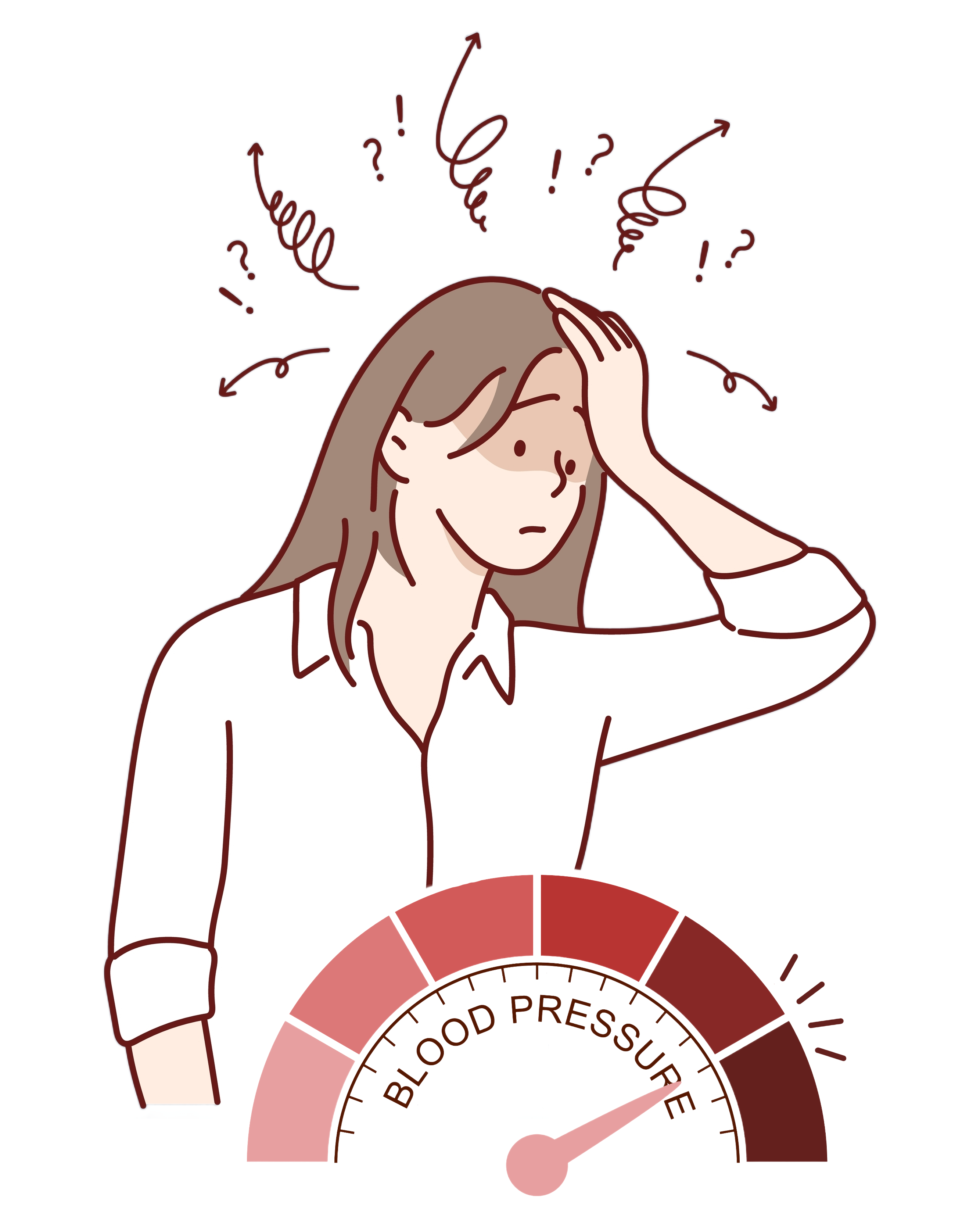The role of stress and anxiety in hypertension remains debated.1 While psychological stress has been linked to temporary blood pressure (BP) increases via sympathetic activation, its role in sustained hypertension remains unclear.2,3
A 2001 study (n=796) found that while conducting a stressful task (solving Raven’s matrices, a set of pattern-based prediction questions, while being made to feel that they were performing sub-optimally), BP on average increased by 20.17/7.88 mmHg.4
Similarly, acute job stress has been linked to short-term increases in BP. A meta-analysis of 29 studies found that after exposure to job strain, workers had an average ambulatory BP increase of 3.43/2.07 mmHg (p<0.001), although BP did not remain significantly elevated for 24-hour readings.5 A subgroup analysis showed that men experienced a greater rise in BP of 3.85/1.97 mmHg (p<0.001). Women had a smaller but still significant increase of 2.58 mmHg in systolic BP (SBP) (p=0.05), although the change in diastolic BP (DBP) was not significant.
Long-Term Effects
There is conflicting evidence on the long-term effects of psychosocial factors on the development of hypertension. A 2009 review found that out of seven studies on the effect of chronic stress on hypertension, five found a positive association while two did not.6 The many confounding factors for the development of hypertension make it difficult to establish a causal relationship and can also lead to lower quality evidence. Additionally, most studies examining the relationship between stress and hypertension have focused on occupational stress, leaving a gap in the evidence for the potential effects of the many other sources of stress in people’s lives.
A seminal study on stress and hypertension, the Coronary Artery Risk Development in Young Adults (CARDIA) study, followed 3,200 normotensive participants aged 20-32 at baseline in 1987 until 1995.7 While those who went from low to high job strain over the 8-year follow-up had higher rates of hypertension (4.93%) compared to those who went from high to low job strain (4.93% vs 1.62%), those with high job strain at both points had similar rates of hypertension to those who had low job strain at both points (2.80% vs 2.64%).
A 2007 prospective cohort study following 448 participants over 6.5 years also had heterogeneous results.8 Men with high job stress had significantly increased SBP (4.6 mmHg, p=0.045) and DBP (4.1 mmHg, p=0.004) compared to their baseline characteristics. However, after adjusting for antihypertensive treatment and baseline BP, the SBP increase was no longer significant, and there were no significant associations at all for women.
Another 2003 longitudinal study following 209 healthy participants over five years found that job stress was not associated with hypertension.9 BP readings were similar between both those with high and low job stress (24-hour BP 120/77 mmHg for both), and more participants with low job stress developed hypertension over the follow-up period (33.3% vs 27.9% for high job stress). Analyses found that age and body mass index (BMI) were the only positively correlated determinants of hypertension.
In addition to potential long-term physical responses to stress, there is also evidence that stress can lead to an increase in unhealthy behaviors such as alcohol consumption and poor dietary choices. A 2009 prospective cohort study (n=7,066) found that compared to those with low levels of perceived stress, those with high levels stress were more likely to be physically inactive (26% vs 12%) and participate in risky drinking (17% vs 12%).10 According to American College of Cardiology and American Heart Association (ACC/AHA) guidelines, both alcohol use and decreased physical activity both increase the risk for the development of hypertension.11
Stress Reduction
Given the connection between stress, anxiety, and hypertension, stress-reduction strategies have been explored as potential interventions to improve BP control. Mindfulness-based stress reduction (MBSR) has been widely studied as a non-pharmacological approach to BP control. A 2022 meta-analysis of seven randomized controlled trials (n=429) found that while there was a positive association between MBSR and DBP control (mean decrease of 5.51 mmHg, p=0.05), there was no significant effect on SBP, and the quality of the evidence was very low with a high degree of heterogeneity.12 The 2017 ACC/AHA Hypertension guidelines conclude that stress reduction is not sufficiently proven to lower BP to recommend it as an antihypertensive strategy.1
References
- Whelton PK, Carey RM, Aronow WS, et al. 2017 ACC/AHA/AAPA/ABC/ACPM/AGS/APhA/ASH/ASPC/NMA/PCNA Guideline for the Prevention, Detection, Evaluation, and Management of High Blood Pressure in Adults: A Report of the American College of Cardiology/American Heart Association Task Force on Clinical Practice Guidelines. J Am Coll Cardiol. 2018/05/15/ 2018;71(19):e127-e248. doi:10.1016/j.jacc.2017.11.006
- Liu MY, Li N, Li WA, Khan H. Association between psychosocial stress and hypertension: a systematic review and meta-analysis. Neurol Res. 2017/06//undefined 2017;39(6):573-580. doi:10.1080/01616412.2017.1317904
- Rozanski A, Blumenthal JA, Kaplan J. Impact of psychological factors on the pathogenesis of cardiovascular disease and implications for therapy. Circulation. 1999/04/27/ 1999;99(16):2192-217. doi:10.1161/01.cir.99.16.2192
- Carroll D, Smith GD, Shipley MJ, Steptoe A, Brunner EJ, Marmot MG. Blood pressure reactions to acute psychological stress and future blood pressure status: a 10-year follow-up of men in the Whitehall II study. Psychosom Med. Sep-Oct 2001;63(5):737-43. doi:10.1097/00006842-200109000-00006
- Landsbergis PA, Dobson M, Koutsouras G, Schnall P. Job strain and ambulatory blood pressure: a meta-analysis and systematic review. Am J Public Health. 2013/03//undefined 2013;103(3):e61-71. doi:10.2105/ajph.2012.301153
- Sparrenberger F, Cichelero FT, Ascoli AM, et al. Does psychosocial stress cause hypertension? A systematic review of observational studies. Journal of human hypertension. Jan 2009;23(1):12-9. doi:10.1038/jhh.2008.74
- Markovitz JH, Matthews KA, Whooley M, Lewis CE, Greenlund KJ. Increases in job strain are associated with incident hypertension in the CARDIA Study. Ann Behav Med. Aug 2004;28(1):4-9. doi:10.1207/s15324796abm2801_2
- Ohlin B, Berglund G, Rosvall M, Nilsson PM. Job strain in men, but not in women, predicts a significant rise in blood pressure after 6.5 years of follow-up. Journal of hypertension. Mar 2007;25(3):525-31. doi:10.1097/HJH.0b013e32801220fa
- Fauvel JP, M'Pio I, Quelin P, Rigaud JP, Laville M, Ducher M. Neither perceived job stress nor individual cardiovascular reactivity predict high blood pressure. Hypertension. Dec 2003;42(6):1112-6. doi:10.1161/01.Hyp.0000102862.93418.Ee
- Rod NH, Grønbaek M, Schnohr P, Prescott E, Kristensen TS. Perceived stress as a risk factor for changes in health behaviour and cardiac risk profile: a longitudinal study. J Intern Med. Nov 2009;266(5):467-75. doi:10.1111/j.1365-2796.2009.02124.x
- Whelton PK, Carey RM, Aronow WS, et al. 2017 ACC/AHA/AAPA/ABC/ACPM/AGS/APhA/ASH/ASPC/NMA/PCNA guideline for the prevention, detection, evaluation, and management of high blood pressure in adults: executive summary: a report of the American College of Cardiology/American Heart Association Task Force on Clinical Practice Guidelines. Hypertension. Nov 13 2017;doi:10.1161/hyp.0000000000000066
- Geiger C, Cramer H, Dobos G, Kohl-Heckl WK. A systematic review and meta-analysis of mindfulness-based stress reduction for arterial hypertension. J Hum Hypertens. 2023/03//undefined 2023;37(3):161-169. doi:10.1038/s41371-022-00764-z



